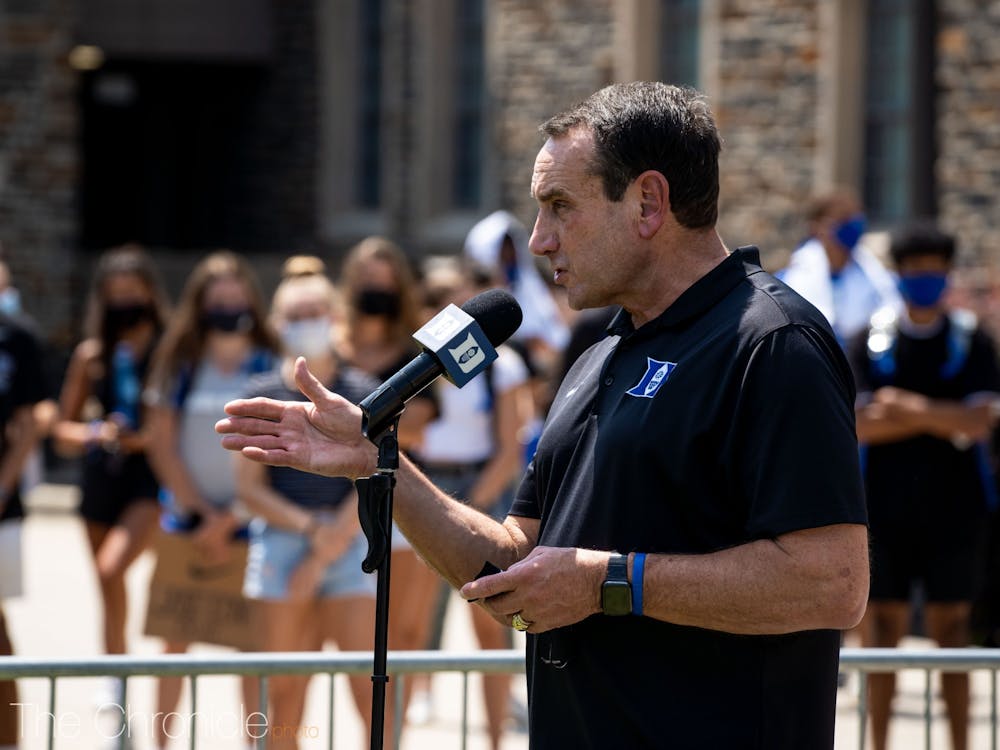Let’s face it—we all miss basketball. With a dissatisfying end to the 2020 basketball season, combined with a long and miserable hiatus of sports in general, Duke fans can nearly unanimously pronounce that basketball needs to come back as soon as possible. How this happens, however, is a different story.
Last Wednesday, head coach Mike Krzyzewski, in partner with the other ACC basketball coaches, held a press conference to introduce the idea of a 346-team NCAA tournament for the 2021 basketball season. This proposal, according to these coaches, took safety protocol into consideration and valued the addition of college basketball, since there "is no better way" to celebrate the game. However, I consider this to be furthest from the truth. The idea of a 346-team tournament can and will leave any college basketball fan drooling, but the execution would simply be infeasible.
During a normal NCAA tournament, 67 games are played to determine a winner. In this new format, 345 games would need to be played. Assuming that the optimal strategy is set in place to make the bracket as streamlined as possible, the tournament itself would more obviously outlast the duration of a normal year. This doesn’t even begin to factor in the time it would take to quarantine the advancing teams once they enter a new round, of which there would be several more than usual. And even then, the amount of contact that a team encounters would grow exponentially, leaving the players, coaches and staff at higher risk. The very nature of a single-elimination bracket is that half of the eligible teams will be defeated and leave after every round of games. While the numbers are somewhat small on a normal year, 173 college basketball teams would travel, pay heightened costs for the safety of the coaches and players and quarantine multiple times just to play one game that may or may not be televised, depending on the quantity of games on that day. I have a hard time believing that many small schools will jump on that opportunity.
This is all being said without taking into consideration the talent gap within the NCAA. Duke, along with the other blue blood programs, would be given a high seed, and are therefore set to play some of the lowest, and weakest, teams in college basketball. The element of upset is what makes the NCAA tournament so entertaining to watch, but what many fans fail to recognize is that every team that competes understands how to win. For many of the smaller schools, they must win their conference championship, alongside an above-average record, to be considered for the “big dance." The lowest seeds in this newly-devised tournament would most likely be teams that haven't won a single game all season. While I try to be optimistic about it, what are the chances that their first win comes against the giants of the ACC? We are then left with several rounds of meaningless games until we can get to the games that actually matter, which is what the NCAA tournament is in the first place.
Don’t get me wrong, I love the idea of a larger NCAA tournament in theory—just imagine what that monster bracket would look like! However, this is not the time to be doing it. While I agree that a new and improvised approach will be needed for the 2021 basketball season, the execution of an expanded basketball tournament will only occur in my dreams.
It is worth noting that the NCAA has released a counter-statement that shut down the proposal, despite the ACC's continued push.
Get The Chronicle straight to your inbox
Signup for our weekly newsletter. Cancel at any time.

